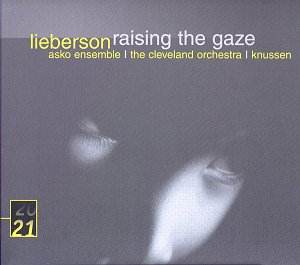"Drala is probably Peter Liebersonís best
known work, and if there is a more sheerly beautiful stretch of late
20th century music than its opening Invocation, I
donít know it". So says Oliver Knussen in his booklet introduction
to Liebersonís music. Itís a bold statement and I could name a few other
works that could lay claim to the accolade but it is undeniable that
Invocation is indeed captivating in its haunting beauty. So much
so that I have continually returned to Drala since first listening
to the disc.
A New Yorker, Lieberson studied with, amongst others
Charles Wuorinen and Milton Babbitt, subsequently developing an interest
and active involvement in Tibetan Buddhism, something which has had
a profound influence on many of his works since. This disc is an anthology
of his work spanning the twenty five years between 1972 and 1998, encompassing
both orchestral and ensemble works and taking in a number of stylistic
changes along the way, principally in his initially strict and later
more relaxed use of the 12- tone system.
Drala sits very much at the centre of these
works, written in 1986 to a commission from Seiji Ozawa. Taking as its
starting point the form of a sadhana, a Buddhist meditation piece, Drala
means quite literally "above war". At the centre of the
opening Invocation are a dream like sequence of chords that pervade
much of the work and can often be heard in various guises throughout
the continuously played four movements. It is a work that immediately
engages from the opening bars, coherent in its harmonic structure and
luminously subtle in its orchestration and textural palette. Not unlike
the music of Knussen in fact who has been an ardent champion of Liebersonís
music.
The only other work for full orchestra on the disc,
Fire, is the first and only existing instalment of a projected
orchestral cycle, The Five Great Elements, based on the Tibetan
elements of earth, water, fire, air and space. Originally asked to write
a fanfare for the New York Philharmonic, the composer felt uninspired
by the request instead producing a brief four minute orchestral showpiece,
maybe not quite the fanfare requested but every bit as brilliant. Like
a mini concerto for orchestra the piece condenses virtuosic writing
for every section into its action packed time span with a calmer, more
restrained passage at the central "eye of the storm".
The Concerto for Four Groups of Instruments
is recognisable as the earliest work on the disc in that it is very
audibly the most rigorous in its twelve-tone organisation. As the composer
himself points out, after this work he became rather dissatisfied with
the pointillist style of his earlier music and whilst not wishing to
abandon the hard won techniques of his twelve tone compositions, looked
to create a richer, warmer sound world. Accordance and Free
and Easy Wanderer are perhaps the best examples of this change,
both pieces exploring the idea of "harmonic stations", visited
and revisited, and once again binding the works structurally. In contrast,
Ziji (scored for clarinet, horn string trio and piano), the title
meaning brilliance or the energy of confidence, is an exercise in intuitive
composition, the material all springing from the energetic opening gesture.
Raising the Gaze, whilst inspired by Lieberson hearing
a set of medieval dances on the radio, refers to a point in meditation
practice whereby the downcast gaze can quite literally be raised to
include external influences. Like Ziji, the result is an exuberant
instrumental study, highly concentrated in its energy but this time
driven by a prominent part for percussion. The brief Three Songs
of 1981 set poems by Douglas Penick, a friend of the composer who later
wrote the librettos for his operas King Gesar (1991-92) and Ashokaís
Dream (1997). Rosemary Hardy is accomplished as the soprano soloist,
with the first of the songs, "Listen and Hear" being
particularly memorable for its haunting, nocturnal beauty.
The Deutsche Grammophon 20/21 series is rapidly building
into a valuable and impressive collection of contemporary classics.
Without exception they are superbly packaged, the single discs all coming
in three way opening cases, with comprehensive, exceptionally informative,
booklet notes that give a fine insight into the relevant composerís
work. In this particular case Liebersonís finely crafted music is a
highly worthwhile addition to the series, the performances and recordings
beyond criticism, possibly even definitive. A disc that I would recommend
with all possible enthusiasm and one to which I shall be returning regularly.
Christopher Thomas.


